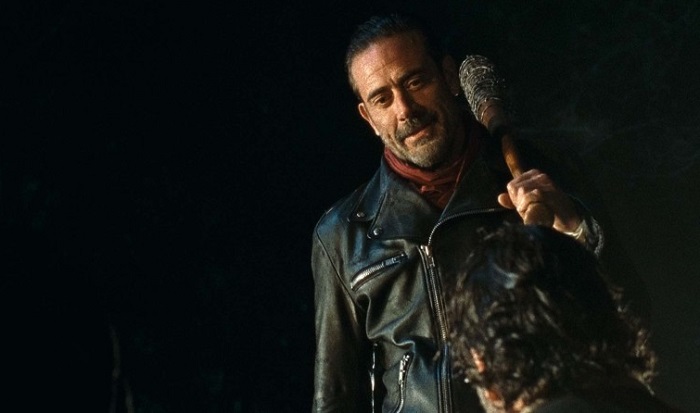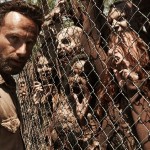
Major spoilers incoming for The Walking Dead — both the show and comic — as well as for old shows you should have watched already like The Shield, Lost and Buffy the Vampire Slayer …
I love cliffhangers. LOVE them. A well-done TV cliffhanger jolts your pleasure centers and sends you out of that episode (or season) on a buzzy high, dying to know what comes next but also supremely satisfied by the twisty journey the show is taking you on. There are many fine examples of this over the last few decades of television.
Think back on the season six finale of Buffy the Vampire Slayer, when Spike was suffering through these painstaking physical trials in order to claim a demon's prize — his greatest desire rewarded. Audiences assumed (and Joss Whedon and his writers no doubt intended us to assume) that it was to get the behavioral-modification chip that had been installed in his brain removed, so that Spike could go back to being the heartless killer he had been in season two. You could hear all of Buffy fandom's jaws drop when a last moment cliffhanger revealed that Spike actually asked that his soul be restored. It was a great cliffhanger, because it played our expectations against us and went instead in the opposite direction. Lost did something similar when it tricked us into thinking the future was the past ("We have to go back!") before pulling the rug out from under us.
Or consider the season five finale of The Shield. That's the one that ended with with Shane Vendrell murdering his fellow Strike Team member Lem rather than taking the risk that Lem would be coerced into testifying against the team. Lem's murder was the best scene in the best episode in one of TV's very best shows. And if that brilliantly-acted, brutal culmination of five years worth of storytelling wasn't enough, the show then set a plan for the future by having Shane's boss, crooked cop Vic Mackey, declare, "We're going to find who did this, and we're going to kill them," right before the camera cuts to black for the season. The Shield built to a season ending that may not have been a total surprise, but was so expertly crafted that viewers had no choice but to be gobsmacked. It wasn't entirely dissimilar from Riker ordering the Enterprise to fire on the Picard-commanded Borg ship in Star Trek: The Next Generation, even if that one was more of a cliffhanger in the classical sense.
All of these are good examples of the proper way to do a TV cliffhanger. Last night's season six finale of The Walking Dead, titled "Last Day on Earth," may now be the best example of how NOT to do one. So what happened, and why did it feel like such a cheat?
For starters, The Walking Dead was building not to a surprise point, but to a point a large portion of its audience knew was coming. In The Walking Dead comic books, there's a character named Negan, who becomes Rick and company's primary antagonist for a stretch. In the book, Negan is introduced by taking a barb-wire-wrapped baseball bat named Lucille and bashing in the head of Glenn, one of the comic's (and show's) most beloved characters. To this point, it's likely the comic's most defining event, one well known not just to regular readers but nearly anyone with a passing interest in the book or show. I've read the first five Walking Dead trades but have never reached this issue. But even I knew about it, as it was hard to avoid the news that Glenn had bought the farm back when that issue was originally published. You can assume a lot of fans were in the same boat.
And if they weren't then, they probably learned about Glenn's comic-book fate once the show started heavily teasing Negan in the back half of the sixth season. Jeffrey Dean Morgan's casting was announced with much fanfare, and online Walking Dead chatter became consumed by his arrival. We got our first glimpse of Lucille in the season-finale preview clip that aired last week, and it was clear to anyone paying attention that the comic's most famous scene would play out over the closing moments of this episode. So the mere arrival of Negan alone could serve as neither a surprise nor a compelling ending to the season.
Even still, there were two legitimate ways to make the finale an effective one. The first was by straight-forwardly adapting the comic as honestly and brutally as possible. Glenn's death at the hands of this sadistic madmen would not have surprised informed fans, but it would had the same effect as the comic by authoritatively announcing Negan as the worst villain our heroes have yet faced. It would have ended the "introduction to Negan" chapter of the show, while kicking off the "holy shit that just happened things are terrible what the fuck are we going to do now?" chapter of the show. It would have felt like a honest season finale and been just fine.
The other option would have been to pull a surprise swerve and have Negan murder someone OTHER than Glenn. That would have accomplished everything the first option did, as well as shocked viewers by giving them something that they didn't expect. Personally, had I been in The Walking Dead writer's room, this is the option I would have pushed for, and I think it would have worked fantastically. Negan's character would be properly established, and the audience would be reminded that they should never get too comfortable thinking they know what's coming.
Inexplicably, showrunner Scott Gimple and his writers chose neither option. Instead, they had Negan play his game of "eeny, meeny, miny, moe," bouncing around the various characters present, before bringing his bat to rest pointed at an unseen cast member. The camera assumes the viewpoint of that unknown character, as Negan brings Lucille down hard on his/her head. Cheesy-looking blood FX flow down the screen before the show cuts to its end credits. The identity of the victim remains a mystery.
This was literally the worst decision possible on how to play out this iconic scene for viewers. As it stands, there was no real drama — because Negan's introduction was known from the source material and telegraphed heavily in the show. There was no surprise — because the event played out without twisting our preconceived notions about what might happen. And there wasn't even any pathos to be had — because viewers weren't even left with a character we can mourn. There were none of these things. There was only disappointment that an anticipated turning of a dark corner had been pushed all the way to next season in what feels like a lame attempt to keep viewers talking about the show over the summer.
What makes all of this worse is that it comes on the heels of a much-debated episode from earlier in the season where Glenn appeared to be eaten by zombies, only for it later to revealed that a less important character had fallen on top of him and it was THAT guy who had been torn apart. Glenn had survived. At the time, a lot of people were angry about the misdirect (which dragged on for weeks). I ended up not minding it so much because I bought Gimple's stated reasoning that, in The Walking Dead universe, characters often can't know if their loved ones are dead or alive at any given moment. That's a solid thematic play. And it could have been made stronger by having Glenn survival that ordeal only to fall victim to Negan's baseball bat.
But immediately moving to another empty cliffhanger where we're once again not exactly sure what happened reeks of screwing with your audience just for the sake of screwing with them. Instead of caring more about who Negan killed, I find myself not really giving a damn. Mostly, I'm wondering if Gimple and the writers even know who died. Have they decided yet? Is it to be determined when the writers room reconvenes for season seven? Regardless, this is not the way to run a TV show.
And it may be the most infuriating decision yet in a series that often showcases infuriating decisions. I've not always been The Walking Dead's biggest fan. I stuck with the show through its early seasons merely because it was TV's only real horror offering at the time and because there were hints it could get better. And it did! Seasons four and five were pretty great. Season six has had a lot of good moments. But there have still been some disastrous decisions made along the way. (For example, Carol getting a personality overhaul that turned the abused housewife-turned-badass into a guilt-riddled quitter is nearly as heinous a crime as the bullshit cliffhanger.)
The show has been a ratings juggernaut for its entire run so far, but viewers can turn on a show awfully quickly. (Ask Heroes or Twin Peaks.) Sometimes one underwhelming finale or ill-conceived cliffhanger is all it takes. "Last Day on Earth" was both, and I don't know if The Walking Dead can recover, no matter who they reveal in the fall was on the receiving end of Negan's bat.











